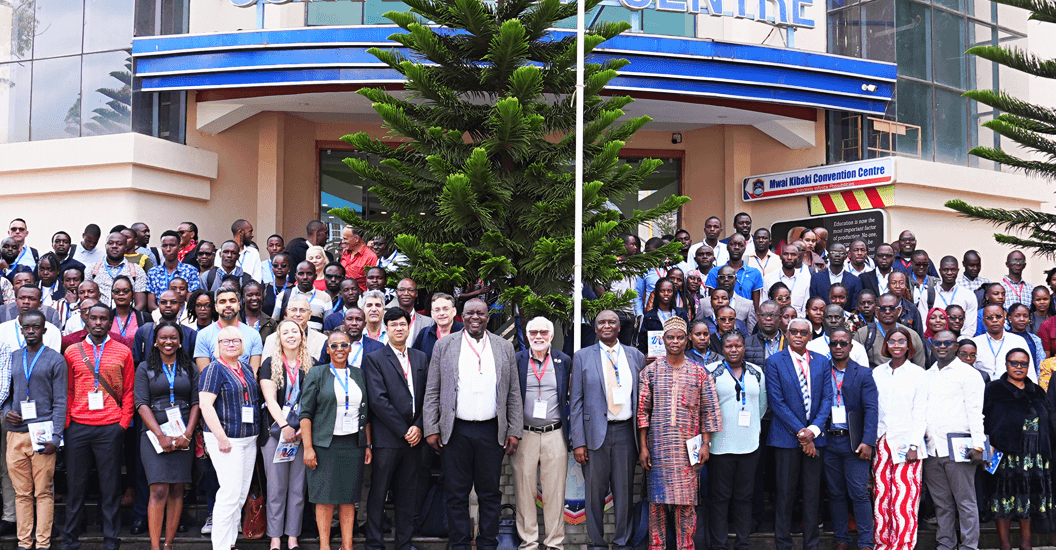Mount Kenya University (MKU), in collaboration with the Kenya Institute of Primate Research (KIPRE), proudly hosted the 7th Africa International Biotechnology and Biomedical Conference (AIBBC 2025) from October 27th to 29th, 2025, at the MKU Thika Main Campus.
The prestigious event brought together distinguished scientists, innovators, educators, and healthcare experts from across Africa and around the world to advance critical discussions and training in biotechnology, biomedical science, and global health.
Opening Ceremony and Leadership Remarks
The conference was officially opened by MKU Vice-Chancellor, Prof. Deogratius Jaganyi, accompanied by Dr. Mercyline Kamande, the Deputy Vice-Chancellor for Academics and Research Affairs, and other senior university leaders. Their presence underscored MKU’s strong commitment to advancing impactful scientific research and driving healthcare transformation in Africa.
In his remarks, Prof. Jaganyi commended the collaborative effort between MKU and AIBBC and KIPRE, emphasizing the role of such scientific gatherings in fostering innovation and mentorship.
“Our role as a university is not only to educate but also to enable discovery and to provide an environment where new ideas can flourish, where collaboration is encouraged, and where mentorship bridges generations. I am particularly proud that this year’s program introduces lectures by senior scientists to strengthen that bridge.”
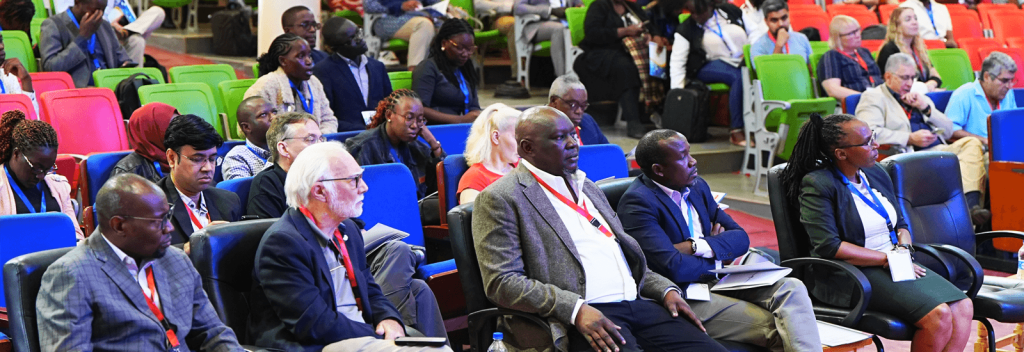
Prof. Jesse Gitaka, MKU’s Director of Research and Development, noted: “I welcome you to the AIBBC 2025 Workshop. This edition is unique as we introduce a new section featuring special lectures by senior researchers, aimed at promoting scientific mentorship and knowledge transfer.”
Theme and Venue
This year’s conference theme, “Transforming Health Through Innovative Research,” highlighted the central role of biotechnology and medical innovation in strengthening healthcare systems and addressing disease burdens globally—particularly within Africa. The event was hosted at MKU’s Institute of Tropical Medicine and Centre for Malaria Elimination, at the state-of-the-art biomedical research laboratory located at the Thika Main Campus. The facility supports advanced research and diagnostics in malaria and other infectious diseases.
Renowned international and regional experts led the training sessions and plenary discussions, including:
- Prof. J. Paul Robinson, Purdue University, USA
- Dr. Bernard Kanoi, Mount Kenya University, Kenya
- Prof. Hemant Agrawal, India Cancer Institute, India
- Prof. Bill Telford, Senior Associate Scientist, USA
- Dr. Ahmad Saleem, KTH Royal Institute of Technology, Sweden
- Dr. Bill Telford, Purdue University, USA
- Prof. Collins Ouma, Maseno University, Kenya
- Prof. C. Evans Egwim, Federal University of Technology, Nigeria
- Dr. Farhad Zamani, Aarhus University, Denmark
- Prof. Guido Poli, Vita-Salute San Raffaele University, Italy
- Prof. Hemant Agrawal, Flow Cytometry Solutions Pvt. Ltd., India
- Prof. Jakob Skou Pedersen, Aarhus University, Denmark
- Prof. Kennedy Okeyo, Purdue University, USA
- Prof. Jesse Gitaka, Mount Kenya University, Kenya
- Dr. Liza Löf, Uppsala University, Sweden
- Dr. Lucy Ochola, KIPRE, Kenya
- Prof. Masood Kamali-Moghaddam, Uppsala University, Sweden
- Prof. Paul Robinson, Purdue University, USA
- Dr. Radiosa Gallini, Uppsala University, Sweden
- Dr Daniel Muema, KAVI, Kenya
The presence of such an impressive lineup of global scientists physically, reaffirmed the growing recognition of AIBBC as one of Africa’s premier platforms for biotechnology and biomedical research training.
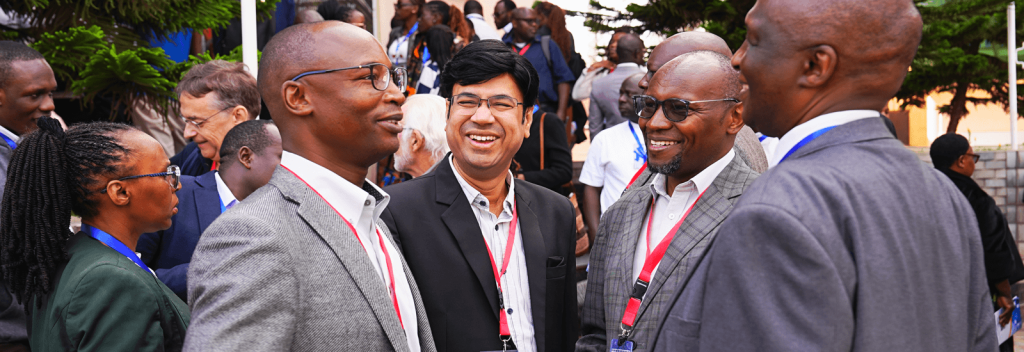
Participation and Global Representation
The 7th AIBBC attracted 202 participants, comprising 25 instructors and 23 facilitators from Kenya, the USA, Sweden, Nigeria, Italy, South Africa, Japan, India, and Uganda, and 154 delegates from Kenya, Nigeria, Denmark, Japan, South Africa, Malawi, Egypt, Tanzania, and Hungary.
This diverse participation reflected the conference’s growing international appeal and MKU’s reputation as a center of excellence in biotechnology capacity building and health innovation.
Training Workshops and Hands-on Learning
Participants benefited from six specialized training tracks, combining lectures and intensive laboratory-based sessions. The courses covered a wide range of advanced biotechnological and biomedical techniques:
- Point-of-Care Diagnostics Course
Focused on Immiscible Filtration Assisted by Surface Tension (IFAST) and Loop-mediated Isothermal Amplification (LAMP) technologies, demonstrating how rapid diagnostic tools can revolutionize field testing in low-resource settings. - Molecular Diagnostics Course
Provided hands-on practice in advanced PCR, sequencing, and molecular identification techniques for pathogen detection and surveillance. - Genomics and Bioinformatics Course
Delivered insights into R programming and modern genomics technologies, including omics data analysis, data visualization, and statistical modeling using Tidyverse packages. - Clinical Immunology and Infectious Diseases Course
Offered an in-depth understanding of immune mechanisms, vaccine design, and immunopathology, led by expert immunologists. - Parasitic Infections and Zoonoses Course
Focused on malaria parasites and tsetse flies as vectors of parasitic infections, integrating the One Health approach to disease surveillance and control. - Flow Cytometry Course
Provided comprehensive training on cell analysis using flow cytometry, emphasizing sample preparation, instrument calibration, and data interpretation in immunology and infectious disease diagnostics.
These interactive sessions facilitated rich knowledge exchange, practical skill-building, and exposure to emerging biotechnological innovations shaping the future of healthcare.
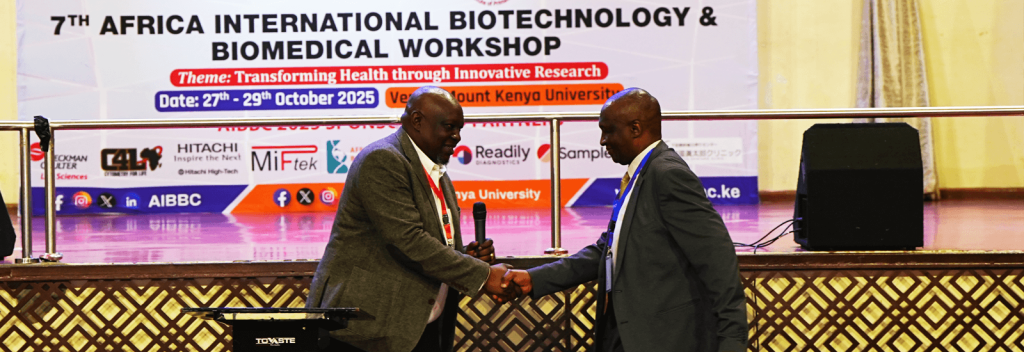
Strategic Partnerships and Industry Support
The conference received strong backing from institutional and industry partners, including AIBBC, SHOKOKU SHINTARO CLINIC, TOUCH, SimpleFacts, Beckman Coulter Life Sciences, Readily Diagnostics, C4L, Hitachi, MIFTEK, and Africa Biosystems Limited.
Their support fostered an innovation ecosystem linking academia, industry, and healthcare practice – reinforcing AIBBC’s role as a collaborative platform for scientific advancement.
Building Capacity and Advancing Africa’s Health Research Agenda
The 7th Africa International Biotechnology and Biomedical Conference strengthened scientific networks, showcased Africa’s growing leadership in global health research, and empowered early-career scientists through mentorship and skill-building.
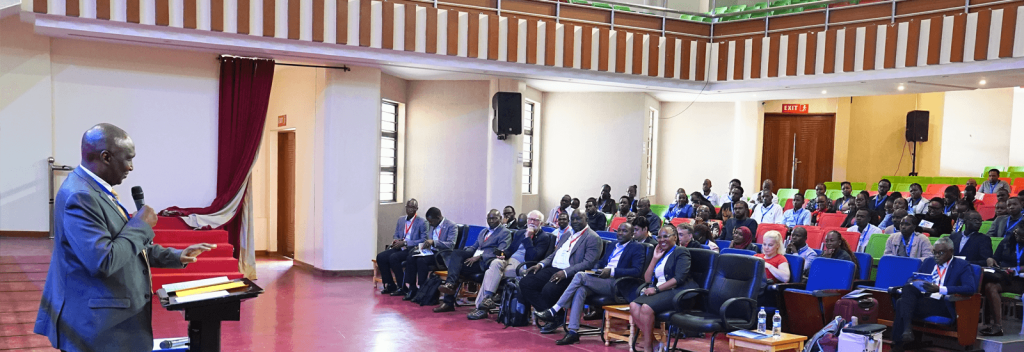
“Such collaborations empower our researchers and students to contribute meaningfully to Africa’s health transformation and global scientific progress,” noted Dr. Kamande, MKU’s Deputy Vice-Chancellor for Academics and Research Affairs. Through strategic partnerships and sustained investment in research capacity, Mount Kenya University continues to position itself as a leading hub for biotechnology, biomedical innovation, and transformative research in Africa and beyond.

